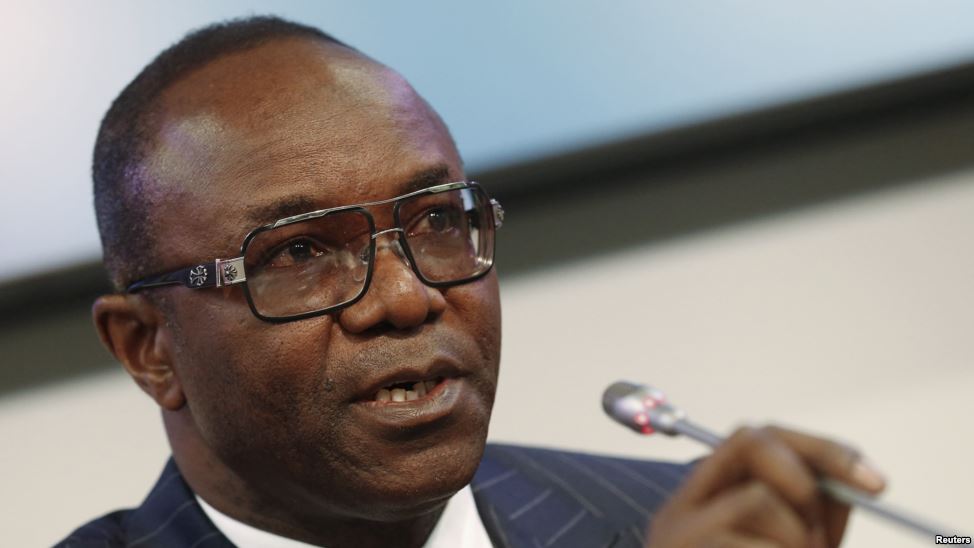- N4.74tn Spent on Fuel Imports in 2016 – Kachikwu
In the last one year, the country has spent about N4.74tn on the importation of petroleum products, an amount that is made up of N3.4tn for the actual products and N1.34tn on logistics.
The Minister of State for Petroleum Resources, Dr. Ibe Kachikwu, who stated this at a press conference in Abuja on Thursday, said, “The importation of petroleum products between January and December of last year amounted to about 20 million metric tonnes. A total amount of N3.4tn was spent.
“The consumption of foreign exchange from the Central Bank of Nigeria was approximately 30 per cent of the CBN’s total foreign exchange outlay, and the logistic cost of that importation was about N1.34tn within the same one year period.”
Explaining why the country must end the importation of refined petroleum products, he added, “The domestic refining capacity as of today is six million litres out of a total consumption of about 35 million litres, averaging less than 25 per cent.
“In the midst of this sort of statistics, it is absolutely critical that we move in to try to end importation of products, improve our refineries and get them up to 100 per cent nameplate.”
The minister also said the government had neither given out any of the refineries to private investors as concessions nor had disposed them.
According to him, no financier has been selected to revamp the refineries as the government is still searching.
He also stated that the Federal Government would require about $1.2bn to repair and bring the four refineries in Port Harcourt, Warri and Kaduna up to 100 per cent production level.
Kachikwu said, “Internally, we have been able to determine the sort of amount that will be required to do this work in terms of what work is really required to be done. The total cumulative amount is in the $1.1bn and $1.2bn category between all the refineries.
“And that, of course, does not include the pipelines. You have got to address the pipelines and that is something else that is being done.”
He stated that so far, no financier had been selected for the refineries as planned, adding that what had happened was that advertisements were placed in some national and international newspapers in April last year seeking financiers to fund, rehabilitate and jointly operate the refineries.
This, the minister said, was in order to increase the capacity utilisation of the facilities and that nowhere in those adverts was it stated that there would be a transfer of the assets to any eventual successful financier.
Kachikwu, however, stated that the tender process for financiers was truncated in May last year following concerns raised by the National Assembly and the Bureau of Public Enterprises.
The concerns, according to him, were thrashed out and an understanding was reached that the rehabilitation process would not adversely impact any future Federal Government’s privatisation initiative.
He noted that following the understanding that was reached by the parties, a presidential approval was granted the Nigerian National Petroleum Corporation in October to engage credible financiers to rehabilitate and improve the performance of the refineries.
He stated that three possible partners, Agip, Saudis and Qataris were initially identified for engagement.
The minister said the government also indicated that it would invite the original builders for the refineries to undertake the repairs.
With regard to the co-location of refineries, Kachikwu stated that a public tender was announced in April last year and bids were received and analysed, adding that winners for the Port Harcourt and Warri refineries had been identified.
He stated that discussions on the issue were still ongoing to finalise the process, with approval to be given by both the NNPC Board and the Federal Executive Council.

 Forex3 weeks ago
Forex3 weeks ago
 Naira2 weeks ago
Naira2 weeks ago
 Billionaire Watch2 weeks ago
Billionaire Watch2 weeks ago



 Naira3 weeks ago
Naira3 weeks ago






 Naira2 weeks ago
Naira2 weeks ago




 Naira1 week ago
Naira1 week ago




 Naira4 weeks ago
Naira4 weeks ago






 Naira1 week ago
Naira1 week ago
























